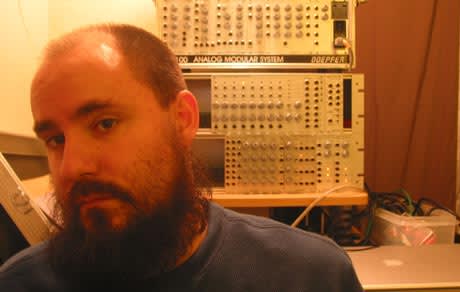Stillness and stability are not personal watchwords for KFW. In his decade long career hes had no fewer than six aliases, and by mid-year his discography will surpass 100 releases. As Hrvatski he has sprung ADD-inducing drum & bass, but lately hes explored the softer side of synthetic sound. Last years Multiples was kind of a love letter to the history of analog synthesisers and minimalist composition. Before that there was Playthroughs, an album exploring real-time computer manipulations of guitar. Playthroughs is also the system (outlined in great detail on his website) built as a mind-boggling web of pedals, samplers and software, processing a sound that does not so much drone as bubble, shimmer and flicker. Using an expanded version of the system with microphones and field recordings, this October 2005 live set breathes and flows in overlapping "movements. Each rises to reach peaks of volume and complexity that spark and crackle like the sentient planet in the remake of Solaris. At the 28-minute mark this density subsides to allow the oddly alien sounds of physical objects and footsteps echoing in the quiet. While Fennesz and Oren Ambarchi occupy a similar space in the guitar/computer set, Whitmans music dips deeper into the historical well of sound.
The "Playthroughs system you use seems to generate a fairly stable and emblematic sound. The Playthroughs system is far from stable! Thats part of what makes it interesting. Not only is my programming shoddy and illogical, a single wrong note or poorly tracked one will ruin the entire concert/recording! Its only that rare occurrence when everything falls into place, which is why the set documented on Recorded in Lisbon is so remarkable everything worked!
Youve used an early version of the set up opening for Damon & Naomi and Yo La Tengo. Were these crowds generally receptive to the sound? In a way I feel the mid- to late 90s audiences for my solo guitar sets, which bordered more on "noise than anything Im doing now, were even more receptive. Back then there wasnt exactly a pantheon of solo guitar, electronic composer/performer types. While more musicians become attuned to the mind-set, the listener-at-large feels inundated with seemingly also-ran music. But even still, theres strength in numbers.
Do you have any interest in tackling the song form? Ive had a 30-plus year love affair with pop music. Its fine the way it is and I dont necessarily feel like meddling with it!
(Kranky)The "Playthroughs system you use seems to generate a fairly stable and emblematic sound. The Playthroughs system is far from stable! Thats part of what makes it interesting. Not only is my programming shoddy and illogical, a single wrong note or poorly tracked one will ruin the entire concert/recording! Its only that rare occurrence when everything falls into place, which is why the set documented on Recorded in Lisbon is so remarkable everything worked!
Youve used an early version of the set up opening for Damon & Naomi and Yo La Tengo. Were these crowds generally receptive to the sound? In a way I feel the mid- to late 90s audiences for my solo guitar sets, which bordered more on "noise than anything Im doing now, were even more receptive. Back then there wasnt exactly a pantheon of solo guitar, electronic composer/performer types. While more musicians become attuned to the mind-set, the listener-at-large feels inundated with seemingly also-ran music. But even still, theres strength in numbers.
Do you have any interest in tackling the song form? Ive had a 30-plus year love affair with pop music. Its fine the way it is and I dont necessarily feel like meddling with it!
